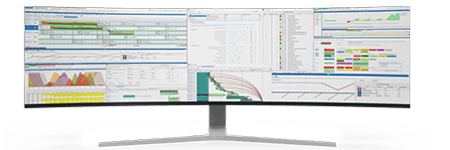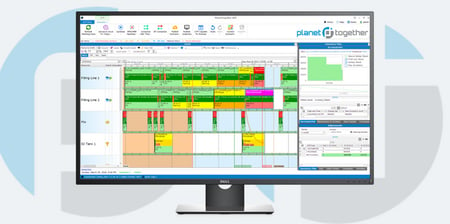Improving Quality Control in Medical Manufacturing
Ensuring high standards for safety, efficacy, and regulatory compliance in products like medical devices, pharmaceuticals, and diagnostic equipment isn’t optional—it’s the very core of maintaining trust, meeting stringent regulatory standards, and delivering life-saving products. Yet, achieving these high standards consistently remains challenging as product lines expand, production volumes increase, and supply chains become more complex. For a Manufacturing IT Manager, the goal is clear: integrate advanced technology to streamline and enhance quality control processes.
Here, PlanetTogether’s advanced planning and scheduling (APS) capabilities, especially when integrated with robust ERP systems like SAP, Oracle, Microsoft, Kinaxis, and Aveva, offer substantial advantages.
Together, these tools can provide a real-time, holistic view of the production floor, improving traceability, reducing downtime, and ensuring regulatory compliance while maintaining a steady focus on quality.

Quality Control Challenges in Medical Manufacturing
Quality control in medical manufacturing is distinctively complex due to several factors:
Regulatory Standards: Compliance with agencies like the FDA or ISO is rigorous, requiring detailed documentation, validated processes, and adherence to stringent protocols.
Product Complexity: Medical products often involve intricate designs, highly sensitive materials, and specialized manufacturing techniques.
Traceability Requirements: Every part, component, and ingredient in the product must be traceable to its source to ensure quick recall and quality investigations when necessary.
Consistency Across Batches: Minor variations in manufacturing can compromise product efficacy, making consistency crucial.
With so much at stake, manufacturing IT managers must seek ways to align production processes seamlessly, ensure data integrity, and employ real-time insights for proactive quality management.
![]()

The Role of PlanetTogether APS in Quality Control
PlanetTogether’s APS solution has advanced features that support quality control by integrating tightly with leading ERP systems, creating a unified system for managing all aspects of production. This seamless integration enhances several areas essential to quality control:
Real-Time Production Visibility
Integration with ERP systems like SAP, Oracle, and Microsoft provides real-time updates across all production stages. PlanetTogether can pull and push data continuously from these ERPs, delivering a comprehensive view of the shop floor.
Real-time production monitoring identifies any deviations or quality issues immediately, allowing managers to take corrective actions before products move to the next stage in the production line.
Enhanced Traceability and Compliance
Medical manufacturing demands granular traceability, which PlanetTogether supports through its integration with ERPs and MES (Manufacturing Execution Systems). By maintaining a centralized record of production data, it provides complete traceability for each product component and production step.
When integrated with SAP or Oracle, PlanetTogether leverages these systems’ strengths in material traceability and quality audits. This helps to comply with regulatory requirements while facilitating faster, more accurate recall processes when necessary.
Proactive Quality Issue Detection and Reporting
By connecting with Microsoft or Kinaxis solutions, PlanetTogether can analyze production data in real-time to identify patterns or trends indicative of quality issues. Kinaxis, known for its capabilities in supply chain management, allows PlanetTogether to predict potential material or process issues upstream, addressing them before they impact the final product.
ERP integration allows automated reporting of quality deviations, triggering alerts and generating comprehensive quality control reports. This proactive approach helps teams stay one step ahead of potential quality issues.
Data-Driven Process Optimization
Integrated with ERP systems, PlanetTogether supports continuous improvement initiatives by analyzing historical production data to pinpoint inefficiencies or frequent quality bottlenecks.
For example, Oracle’s analytics capabilities combined with PlanetTogether’s APS can help the IT manager make data-driven decisions on process improvements, minimize wastage, and increase productivity without sacrificing quality.

Key Benefits of Integrating PlanetTogether APS with Leading ERP Systems for Quality Control
Improved Decision-Making with Real-Time Analytics
When PlanetTogether is integrated with SAP, Oracle, or Aveva, it enables the use of real-time analytics to track quality metrics and KPIs at every stage of production. This information empowers IT managers to make fast, informed decisions regarding process adjustments, staffing, or material procurement.
These analytics also enable predictive quality monitoring. When coupled with advanced ERP analytics, PlanetTogether can highlight trends in downtime, defects, or batch variations, allowing quality teams to adjust processes before a defect impacts production.
Enhanced Process Automation and Efficiency
PlanetTogether’s integration with Microsoft or Oracle automates many repetitive quality control tasks. From automated quality checks to workflow management, these integrations streamline manual processes and reduce human error.
Automated documentation of quality checks, compliance reports, and production adjustments ensures that no data is lost and that audits and inspections are straightforward and efficient.
Seamless Compliance with Regulatory Standards
By integrating with ERP systems known for regulatory compliance management, like SAP and Aveva, PlanetTogether can ensure that every step of production adheres to the necessary standards. Compliance documentation, essential for both internal audits and regulatory inspections, is generated automatically.
In the case of recalls, an integrated system can rapidly trace the root cause by pinpointing which batches or components were affected, enabling a targeted and timely response.
Accelerated Production with Minimal Quality Risk
While production speed is often at odds with quality, integrating PlanetTogether with ERP systems allows manufacturing facilities to increase throughput while maintaining quality standards. The APS platform, in combination with an ERP, can evaluate the impact of increasing production speed on quality metrics, allowing IT managers to make decisions that balance efficiency and quality.
Comprehensive Reporting and Insights
ERP systems, particularly those like Kinaxis with advanced reporting capabilities, allow PlanetTogether to provide insights into material quality, production schedules, and bottlenecks. These insights form a foundation for continuous improvement.
Customizable dashboards provide stakeholders with transparency and visibility, highlighting key quality metrics across departments and making it easier to implement company-wide quality initiatives.

Best Practices for Integrating PlanetTogether and ERP Systems for Quality Control
To maximize the benefits of integration, IT managers can adopt these best practices:
Prioritize Data Standardization
Ensure that data from all systems, including PlanetTogether, SAP, or Oracle, are standardized. This consistency enables accurate reporting and analytics across the entire manufacturing process and simplifies troubleshooting.
Develop Clear Protocols for Quality Deviations
Establish protocols within PlanetTogether to manage quality deviations effectively. For example, trigger specific alerts when certain quality metrics fall below a threshold, and assign responsibilities to team members for rapid intervention.
Leverage Predictive Maintenance for Quality Control
Integrating predictive maintenance capabilities, such as those in Aveva or Microsoft, helps prevent equipment malfunctions that can lead to quality issues. An APS system that syncs with maintenance schedules can anticipate and prevent breakdowns that might otherwise compromise product quality.
Conduct Regular Integration Audits
Regular audits of integration points between PlanetTogether and ERP systems help to ensure that data remains consistent and that the integration functions optimally. This helps identify any discrepancies or lags in data transfer that could compromise quality control efforts.
Optimize Production Schedules Around Quality Control Needs
PlanetTogether’s APS capabilities allow medical manufacturers to adjust production schedules in real time. Leveraging this flexibility means that facilities can prioritize quality control during shifts or production cycles that have shown to require additional oversight.
Integrating PlanetTogether’s advanced planning and scheduling capabilities with industry-leading ERP systems like SAP, Oracle, Microsoft, Kinaxis, and Aveva is a powerful strategy for Manufacturing IT Managers in the medical field. By aligning real-time data insights, predictive analytics, and automated processes, this integration provides a proactive approach to quality control, helping ensure that every product meets stringent standards without slowing down production.
With improved decision-making, enhanced process automation, seamless compliance, and advanced traceability, the synergy between PlanetTogether and ERP systems equips medical manufacturing facilities to tackle the ever-evolving challenges of quality control head-on.
For IT managers, this means not only streamlining operations but also safeguarding the very integrity of the products their facilities produce. In an industry where quality is synonymous with safety, the benefits of this integration are clear: a faster, smarter, and more secure production environment that keeps quality at the forefront.
Are you ready to take your manufacturing operations to the next level? Contact us today to learn more about how PlanetTogether can help you achieve your goals and drive success in your industry.
Topics: PlanetTogether Software, Integrating PlanetTogether, Enhanced Traceability and Compliance, Real-Time Production Visibility, Medical Manufacturing, Data-Driven Process Optimization, Improved Decision-Making with Real-Time Analytics, Enhanced Process Automation and Efficiency, Seamless Compliance with Regulatory Standards, Proactive Quality Issue Detection and Reporting, Comprehensive Reporting and Insights





















LEAVE A COMMENT